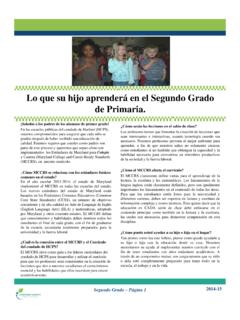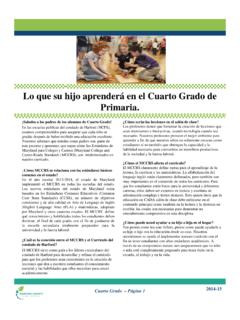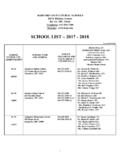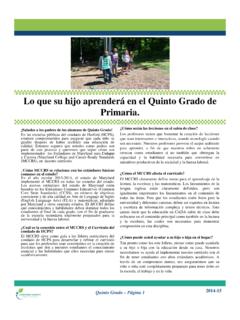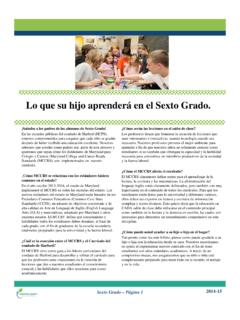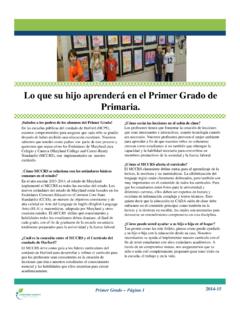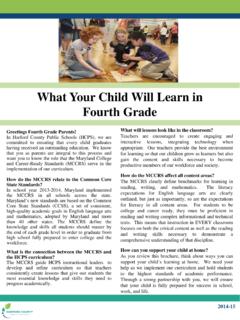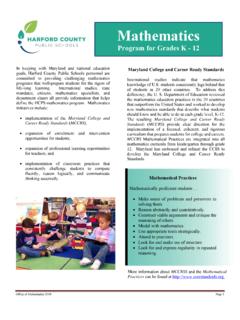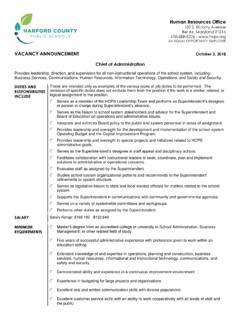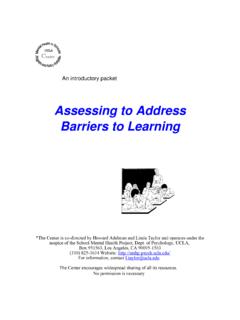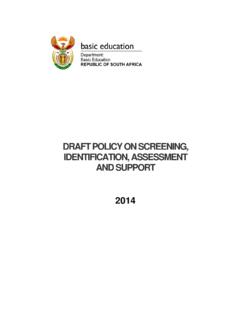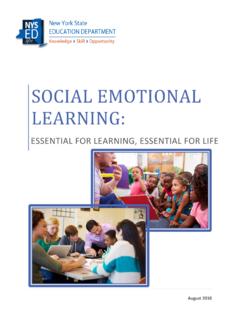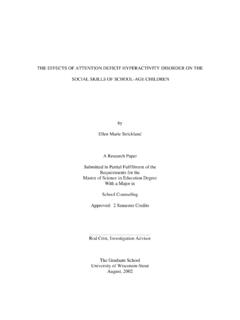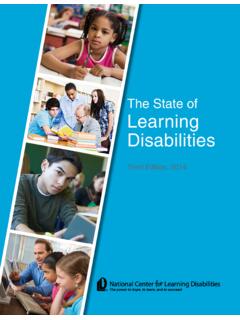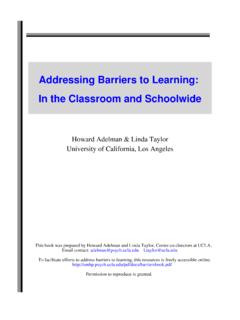Transcription of Social Skills: Promoting Positive Behavior, Academic ...
1 File:///I|/Inetpub/wwwroot/Sites/Instruc tionalSupport/PupilPersonnelServices/mai n/ [8/11/2011 11:08:53 AM] Social skills : Promoting Positive behavior , Academic Success, andSchool SafetyGood Social skills are critical to successful functioning in life. These skills enable usto know what to say, how to make good choices, and how to behave in diversesituations. The extent to which children and adolescents possess good Social skillscan influence their Academic performance, behavior , Social and family relationships,and involvement in extracurricular activities. Social skills are also linked to thequality of the school environment and school most children pick up Positive skills through their everyday interactions withadults and peers, it is important that educators and parents reinforce this casuallearning with direct and indirect instruction.
2 We must also recognize when andwhere children pick up behaviors that might be detrimental to their development orsafety. In the past, schools have relied exclusively on families to teach childrenimportant interpersonal and conflict resolution skills . However, increased negativesocietal influences and demands on family life make it imperative that schools partnerwith parents to facilitate this Social learning process. This is particularly true todaygiven the critical role that Social skills play in maintaining a Positive schoolenvironment and reducing school violence. Consequences of Good Social skills With a full repertoire of Social skills , students will have the ability to make socialchoices that will strengthen their interpersonal relationships and facilitate success inschool.
3 Some consequences of good Social skills include: Positive and safe school resiliency in the face of future crises or other stressful life who seek appropriate and safe avenues for aggression and who take personal responsibility for Promoting school of Poor Social SkillsStudents with poor Social skills have been shown to:Experience difficulties in interpersonal relationships with parents, teachers, highly negative responses from others that lead to high levels of peerrejection. Peer rejection has been linked on several occasions with signs of depression, aggression and poor Academic performance as an indirect a higher incidence of involvement in the criminal justice system :///I|/Inetpub/wwwroot/Sites/Instruction alSupport/PupilPersonnelServices/main/ [8/11/2011 11:08:53 AM]Impact on School SafetyGiven the demonstrated relationship between Social skills and school safety, schoolsare increasingly seeking ways to help students develop Positive Social skills , both inschool and in the community.
4 Social skills related to school safety include:Anger managementRecognizing/understanding others point of viewSocial problem solvingPeer negotiationConflict managementPeer resistance skillsActive listeningEffective communicationIncreased acceptance and tolerance of diverse groupsIn isolation, Social skills are not sufficient to ensure school safety; interventionsshould not be limited to student instruction and training. Change in the school cultureshould be facilitated by infusing Social skills training into a comprehensive system ofschool safety and discipline policies, emphasizing relationship-building betweenstudents and faculty (teachers and administrators) and between schools and families,and providing effective behavior management and Academic Types of Social SkillsWhile there are hundreds of important Social skills for students to learn, we canorganize them into skill areas to make it easier to identify and determine appropriateinterventions.
5 For example, the Stop and Think program organizes skills into fourareas:1. Survival skills ( , listening, following directions, ignoring distractions, usingnice or brave talk, rewarding yourself)2. Interpersonal skills ( , sharing, asking for permission, joining an activity,waiting your turn)3. Problem-solving skills ( , asking for help, apologizing, accepting consequences,deciding what to do)4. Conflict resolution skills ( , dealing with teasing, losing, accusations, being leftout, peer pressure)Identifying Social skills Deficits Prior to determining the best means to help a student develop better Social skills , it isimportant to understand specifically what a student can and can t do.
6 It is crucial toassess and classify the nature of a child s Social skill deficits in order to devise andimplement the most appropriate intervention. Children may experience difficulty performing a skill:Due to lack of knowledge (acquisition deficits), , the child does not knowthe skills or does not discriminate when a skill is appropriate. For example, achild grabs a pencil from a peer in class when she needs one because she doesfile:///I|/Inetpub/wwwroot/Sites/Ins tructionalSupport/PupilPersonnelServices /main/ [8/11/2011 11:08:53 AM]not know how to appropriately ask to borrow despite knowledge (performance deficits), , the child knowshow to perform the skills but fails to do so consistently or at an acceptablelevel of competence.
7 For example, although the child understand that he shouldraise his hand to speak in class, and does so much of the time, he willsometimes blurt out a comment without raising his a sufficient degree or level of strength (fluency deficits), , the childknows how to perform skill and is motivated to perform, but demonstratesinadequate performance due to lack of practice or adequate feedback. Forexample, a student has learned what to say and do when confronted withbullying behavior , but her responses are not yet strong enough to be to competing skill deficits or behaviors, , internal or external factorsinterfere with the child demonstrating a learned skill appropriately.
8 Forexample, depression, anxiety, hyperactivity, or negative motivation caninterfere with demonstration of appropriate conflict resolution skills , eventhough the skills have been taught and skills InterventionsEffective Social skills programs are comprised of two essential elements: a teachingprocess that uses a behavioral/ Social learning approach and a universal language orset of steps that facilitates the learning of new behavior . interventions can beimplemented at a school-wide, specific setting, classroom, or individual level, but atall levels the emphasis is on teaching the desired skill, not punishing learning through normal activities.
9 Teachers and parents must takeadvantage of incidental learning, in which naturally occurring behaviors or events areused to teach and reinforce appropriate Social behavior . Adults can reinforcedemonstrated Positive Social skills by praising children when they behave correctly,or offer alternatives to poor decisions to teach the more appropriate behavior . It maybe necessary when working with children who have particular difficulty tointentionally catch them doing the right thing or devise situations in which they canmake a good choice. Address environmental factors. The school or home environment can affect a child sability to learn and perform good Social skills .
10 If a child is experiencing difficultydemonstrating a particular skill, it is best to first evaluate the environment todetermine what might interfere with the child s appropriate acquisition of that instance, a student may be unruly at the beginning of the day because the teacherneeds to establish more specific routines for coming into class, hanging up coats,checking in, etc. Addressing environmental obstacles like this also will benefit allchildren in that individual factors. Some children need more intensive, personalized trainingbecause of individual factors, such as a disability. These interventions might beaimed at children experiencing a specific difficulty or those who have previouslybeen identified as at risk for behavior problems.
